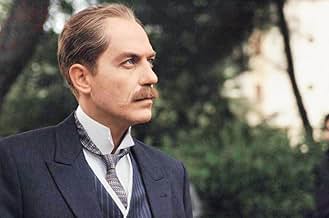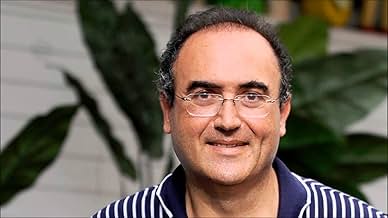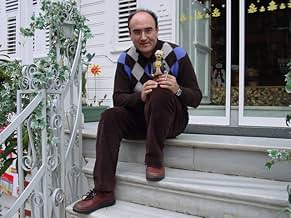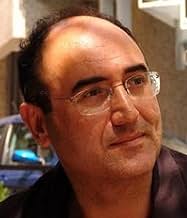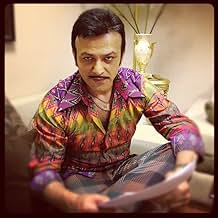Veda
- 2010
- 1h 54min
VALUTAZIONE IMDb
7,2/10
7848
LA TUA VALUTAZIONE
Aggiungi una trama nella tua linguaStory based on the memoirs of Salih Bozok, which traces the life of Mustafa Kemal Atatürk.Story based on the memoirs of Salih Bozok, which traces the life of Mustafa Kemal Atatürk.Story based on the memoirs of Salih Bozok, which traces the life of Mustafa Kemal Atatürk.
- Premi
- 1 vittoria e 4 candidature totali
Özge Özpirinçci
- Fikriye Hanim
- (as Özge Özpirinççi)
Recensioni in evidenza
Incoherent
The film "Veda"directed by Zülfü Livaneli, made in 2010 is a film based on the memoirs of "Salih bozok". A weak drama whose biggest problem is indecisiveness in dealing with the subject. The film is not coherent in this sense. And this has caused even the editing of the film to be undecided. Although the film has been successful in sales, it is structurally weak. In general, the film remains a linear narrative from a diary in praise of Atatürk. From Turkish cinema, much stronger and prominent films have been released at the world level. Movies that will always remain in the history of world cinema.
If this movie is outstanding, it is certainly by it's ability to dodge any depth. No significant analysis of any character, no solid study of the historical context or stake, just a superficial picture of the events through a soap-like art. The author's purpose to grossly suggest along the movie his narration is a jewel of subtle understatement, as a reflection of the oriental sensibility, doesn't produce any effect but a real tediousness. Confronting with such imposture, one could naturally consider this a suggested work to embellish a vanishing symbol, facing times of trouble. It's few to say this subject deserves a better handling: the birth of a modern nation, the fate of millions of people involved, yesterday and today, the difficult questions of liberty and democracy are the real, complete and achieved understatement here.
Mustafa Kemal Ataturk might be the only great man whose life has not been cinematized properly enough. Along with Ziya Öztan's Cumhuriyet (which is more like a Turkish independence movie than a Ataturk biograph)and Can Dundar's widely criticized Mustafa this is actually the first feature length movie on Ataturk. While Can Dundar's Mustafa was a botched up effort to knock Mustafa Kemal off his pedestal and humanize him, Livaneli's movie re-puts him on his perch. Livaneli's Veda starts when Ataurk is on his deathbed. Salih Bozok, who has been a friend to him since he was six is beside him. He calls for his son and tells him that if Ataturk passes away he will end his own life too.Then he starts to write what he recollects about the great leader. So the whole movie,at first glance,seems to be only from Salih Bozok's point of view. When it comes to history one man's point of view should be able to change the whole history you know about, shouldn't it?
Ataturk was one of the greatest men of the century he lived in and we are aware of the fact that his life could not be grasped in a 120 minute movie so it should be understandable that a movie may focus on one part of his life but exactly on what side of his life Livaneli focuses? From Bozok's eyes, Livaneli offers pieces of vignettes or short, impressionistic scenes that do not sound like an eye opener. For instance, the only tangible scene about his childhood is what young Kemal thinks about a children's game like leapfrog. Apparently, the writer and the director want us to think that Ataturk was too great to bend but not modest enough not to vault over other's stooped backs. If you would like to show someone as a child prodigy there are way better means to do that. Other than that the movie does not tell you anything new about Ataturk's childhood or teenage years let alone the fact that the teenage actor,Bartunç Akbaba,playing Musta Kemal offers a pretty wooden performance. Ataturk was an "homme de guerre" and wars are an inevitable part of "gens de guerre". The only scene you see Mustafa Kemal on the war field is the Gallipoli campaign. Let alone the fact that this amazing and unbelievable victory in Turkish history looks more like a poor reconstruction scene from a documentary, most of the little scene focuses on just a ditch.
When you are making a biopic your forte is supposed to be "character development." In Veda, it looks like that there are not many dynamic characters that level up over the course of the narrative.Other than the two major women who walk into Ataturk's life, no character changes a bit. At some point you think you are watching a movie about Fikriye Hanım vs. Latife Hanım. What about Ataturk's feelings on that struggle between Fikriye,who was representing the Orient and Latife who was the Occident?
While Veda duly notes that Ataturk resisted the pressures of historic enmities or "atrocity-mongering between the societies" it never mentions the resistance he met while realizing his reforms.To a foreign layman, the reforms may seem quite ordinary.Those reforms were historically unprecedented and it caused a major resistance from anti-secular circles in Anatolia which still goes on as a sort of Kulturkampf today.
I might prolong this comment but I guess I made myself clear.As a nation we tend to exalt our movies for no reason (like we have done for "Breath") but movies are not made for just one nation.They are made for the whole world to see. Livaneli's effort may be a worthy one(soundtracks,cinematography,costumes and some visual effects were upsides of the movie)but it's not enough to make the whole world see the great leader on the silver screen. I believe, the more movies are made on Ataturk, the better we will understand his legacy.
Ataturk was one of the greatest men of the century he lived in and we are aware of the fact that his life could not be grasped in a 120 minute movie so it should be understandable that a movie may focus on one part of his life but exactly on what side of his life Livaneli focuses? From Bozok's eyes, Livaneli offers pieces of vignettes or short, impressionistic scenes that do not sound like an eye opener. For instance, the only tangible scene about his childhood is what young Kemal thinks about a children's game like leapfrog. Apparently, the writer and the director want us to think that Ataturk was too great to bend but not modest enough not to vault over other's stooped backs. If you would like to show someone as a child prodigy there are way better means to do that. Other than that the movie does not tell you anything new about Ataturk's childhood or teenage years let alone the fact that the teenage actor,Bartunç Akbaba,playing Musta Kemal offers a pretty wooden performance. Ataturk was an "homme de guerre" and wars are an inevitable part of "gens de guerre". The only scene you see Mustafa Kemal on the war field is the Gallipoli campaign. Let alone the fact that this amazing and unbelievable victory in Turkish history looks more like a poor reconstruction scene from a documentary, most of the little scene focuses on just a ditch.
When you are making a biopic your forte is supposed to be "character development." In Veda, it looks like that there are not many dynamic characters that level up over the course of the narrative.Other than the two major women who walk into Ataturk's life, no character changes a bit. At some point you think you are watching a movie about Fikriye Hanım vs. Latife Hanım. What about Ataturk's feelings on that struggle between Fikriye,who was representing the Orient and Latife who was the Occident?
While Veda duly notes that Ataturk resisted the pressures of historic enmities or "atrocity-mongering between the societies" it never mentions the resistance he met while realizing his reforms.To a foreign layman, the reforms may seem quite ordinary.Those reforms were historically unprecedented and it caused a major resistance from anti-secular circles in Anatolia which still goes on as a sort of Kulturkampf today.
I might prolong this comment but I guess I made myself clear.As a nation we tend to exalt our movies for no reason (like we have done for "Breath") but movies are not made for just one nation.They are made for the whole world to see. Livaneli's effort may be a worthy one(soundtracks,cinematography,costumes and some visual effects were upsides of the movie)but it's not enough to make the whole world see the great leader on the silver screen. I believe, the more movies are made on Ataturk, the better we will understand his legacy.
Of course it's not a Darkest Hour or Der Untergang. But it's a decent movie.
Even CGI are not that bad. War props are even good.
Cars look so new because they couldn't aged classic cars. But it's Ok
Scenes are overly dramatized but it's a blockbuster movie for Turkey so It's a must for our market.
Story is Great but lots of incidents happens in a short time so no time for war and most of the politics.
Zülfü Livaneli. You are a decent moviemaker. Decent storyteller. And it is your masterpiece. Very well done. But where is Ismet Pasha?
Even CGI are not that bad. War props are even good.
Cars look so new because they couldn't aged classic cars. But it's Ok
Scenes are overly dramatized but it's a blockbuster movie for Turkey so It's a must for our market.
Story is Great but lots of incidents happens in a short time so no time for war and most of the politics.
Zülfü Livaneli. You are a decent moviemaker. Decent storyteller. And it is your masterpiece. Very well done. But where is Ismet Pasha?
Turkish renaissance man Zülfü Livaneli ("Shahmaran" & "Iron Earth, Copper Sky") draws upon the reminiscences of Atatürk's lifelong friend and loyal ADC Salih Bozok for this sumptuous but shallow hagiographic retelling of the life of the Grey Wolf intended to restore Turkish pride in the wake of the more controversial biopic "Mustafa" by Can Dündar.
With Atatürk on his deathbed a despondent Salih Bozok (Serhat Kılıç) begins to relate the life of the Grey Wolf from their childhood together on the streets of their beloved Thessalonica and on through their military career to the foundation of the republic and the President's tumultuous relationships with Fikriye (Özge Özpirinçci) and Latife (Ezgi Mola).
The talented and prodigious Sinan Tuzcu ("Orada" and "Nefes") takes up the bulk of the screen time as Atatürk between the ages of 25 to 45 but is given very little to work with as the character is two-dimensionally rendered with no apparent emotional depth even when the actor is interacting with his own wife Dolunay Soysert as the Grey Wolf's mother.
Serhat Kılıç heads up the supporting cast as the narrator Salih Bozok but seems curiously absent for all the major events depicted while Özge Özpirinçci and Ezgi Mola are required to carry what little emotional content the film has as the competing love interests and Burhan Güven, Bartunç Akbaba and Kaan Olcay round things out as various incarnations of Atatürk.
The director deliberately sets out to avoid any perceived insult to the Turkish image of their founder and in this respect at least succeeds like any other uninspired hagiography with a loosely strung together episodic collection of supposedly inspiring well-worn incidents from the Grey Wolf's life which ultimately serve to give no true insight into the man himself.
"Unfortunately, words are not enough "
With Atatürk on his deathbed a despondent Salih Bozok (Serhat Kılıç) begins to relate the life of the Grey Wolf from their childhood together on the streets of their beloved Thessalonica and on through their military career to the foundation of the republic and the President's tumultuous relationships with Fikriye (Özge Özpirinçci) and Latife (Ezgi Mola).
The talented and prodigious Sinan Tuzcu ("Orada" and "Nefes") takes up the bulk of the screen time as Atatürk between the ages of 25 to 45 but is given very little to work with as the character is two-dimensionally rendered with no apparent emotional depth even when the actor is interacting with his own wife Dolunay Soysert as the Grey Wolf's mother.
Serhat Kılıç heads up the supporting cast as the narrator Salih Bozok but seems curiously absent for all the major events depicted while Özge Özpirinçci and Ezgi Mola are required to carry what little emotional content the film has as the competing love interests and Burhan Güven, Bartunç Akbaba and Kaan Olcay round things out as various incarnations of Atatürk.
The director deliberately sets out to avoid any perceived insult to the Turkish image of their founder and in this respect at least succeeds like any other uninspired hagiography with a loosely strung together episodic collection of supposedly inspiring well-worn incidents from the Grey Wolf's life which ultimately serve to give no true insight into the man himself.
"Unfortunately, words are not enough "
Lo sapevi?
I più visti
Accedi per valutare e creare un elenco di titoli salvati per ottenere consigli personalizzati
- How long is Veda - Atatürk?Powered by Alexa
Dettagli
- Data di uscita
- Paese di origine
- Siti ufficiali
- Lingua
- Celebre anche come
- Veda - Atatürk
- Luoghi delle riprese
- Salonicco, Grecia(location)
- Azienda produttrice
- Vedi altri crediti dell’azienda su IMDbPro
Botteghino
- Budget
- 6.000.000 USD (previsto)
- Lordo in tutto il mondo
- 55.024.621 USD
- Tempo di esecuzione
- 1h 54min(114 min)
- Colore
- Proporzioni
- 2.35 : 1
Contribuisci a questa pagina
Suggerisci una modifica o aggiungi i contenuti mancanti

